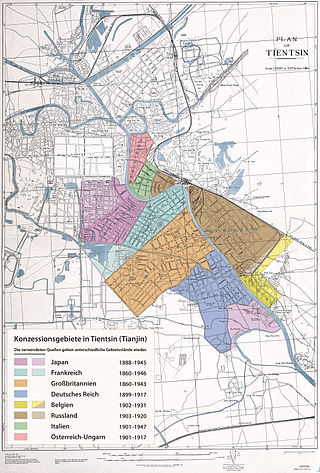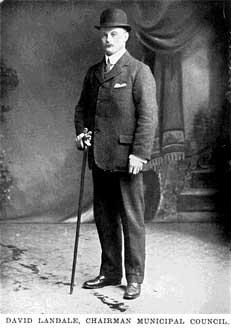
The Shanghai International Settlement originated from the 1863 merger of the British and American enclaves in Shanghai,in which British and American citizens would enjoy extraterritoriality and consular jurisdiction under the terms of unequal treaties agreed by both parties. These treaties were abrogated in 1943.

The foreign concessions in Tianjin were concession territories ceded by the Qing dynasty to a number of European countries,the United States and Japan within the city of Tianjin. There were altogether nine foreign concessions in old Tianjin on the eve of World War II. These concessions also contributed to the rapid development of Tianjin from the early to mid-20th century. The first foreign concessions in Tianjin were granted in 1860. By 1943,all the foreign concessions,except the Japanese concession,had ceased to exist de facto.

The Shanghai Municipal Police was the police force of the Shanghai Municipal Council which governed the Shanghai International Settlement between 1854 and 1943,when the settlement was retroceded to Chinese control.

Edward Isaac Ezra was a wealthy Jewish businessman,who was the first member of the Shanghai Municipal Council who was actually born in China,and who was at one time "one of the wealthiest foreigners in Shanghai". According to one report,Ezra amassed a vast fortune estimated at from twenty to thirty million dollars primarily through the importation of opium,and successful real estate investment and management in early twentieth century Shanghai. Ezra was the largest stockholder and the managing director of Shanghai Hotels Ltd.,and its major financier,and controlled such hotels as the Astor House Hotel in Shanghai.

Harry Edward Arnhold was for five years the chairman of the Shanghai Municipal Council,the body that administered the Shanghai International Settlement in Shanghai,China;the chairman of Arnhold &Co.,which is now Arnhold Holdings Ltd.;and the chairman of the Shanghai Land Investment Company,which owned the Broadway Mansions apartment building in the Hongkou District of Shanghai. Arnhold was a close business associate of Sir Victor Sassoon,and managed various Sassoon enterprises.

Stirling Fessenden,an American lawyer who practiced in Shanghai,was the chairman of the Shanghai Municipal Council from 1923 to 1929 and then Secretary-General of the Council from 1929 to 1939.

Hiram Parkes "Harrie" Wilkinson,KC served as Crown Advocate of the British Supreme Court for China and Japan from 1897 to 1925. He was also Acting Assistant Judge of the British Court for Siam from 1903 to 1905 and Judge of the British High Court of Weihaiwei from 1916 to 1925.

Richard Feetham CMG (1874–1965) was a lawyer,politician and judge in South Africa. He was also the chairman of a number of high-profile international and domestic commissions.

Sir Henry Cowper Gollan CBE KC was a British lawyer and judge. He served as attorney general and chief justice of a number of British colonies in the early 20th century. His last position before retirement was as Chief Justice of Hong Kong.

Edbert Ansgar Hewett,was a prominent British merchant in Hong Kong and China and member of the Executive Council and Legislative Council of Hong Kong.

David Landale was the 13th taipan of the Jardine Matheson &Co. and member of the Executive Council and Legislative Council of Hong Kong.

John Dent (1821–1892) was a British merchant with the trading firm Dent &Co.,a former member of the Legislative Council of Hong Kong and Chairman of the Shanghai Municipal Council.

Sir Edward Charles Pearce was the Chairman of the Shanghai Municipal Council for 7 years,serving throughout World War I.

Alfred Brooke-Smith (1874–1938) was the chairman of the Shanghai Municipal Council for 2 years from 1920 to 1922. He also served as managing director of Jardine Matheson &Co.

Cecil Holliday was the Chairman of the Shanghai Municipal Council in 1906. He also served as commandant of the Shanghai Volunteer Corps.

Harry De Gray (1866–1952) was the Chairman of the Shanghai Municipal Council for 2 years from 1911 to 1913.

James Sturgis Fearon was the Chairman of the Shanghai Municipal Council from 1898 to 1899.

Andreas Moe was a Norwegian merchant and politician for the Conservative Party.

George Godfrey Phillips CBE,was a British barrister and,later,solicitor,who served as the Commissioner General of the Shanghai Municipal Council from 1939 to 1942. He was also co-author with E. C. S. Wade of a leading text on constitutional law.



















